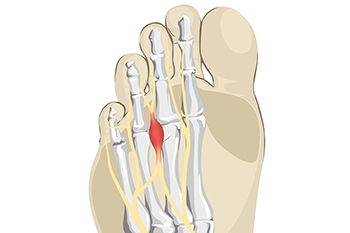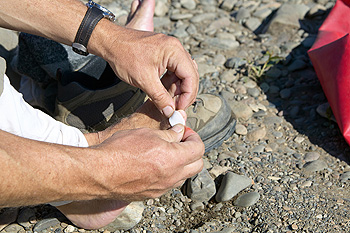Items filtered by date: December 2023
Are You Suffering From Ingrown Toenails?
Recognizing Common Symptoms of Morton’s Neuroma

Morton's neuroma, a nerve disorder affecting the feet, brings forth a unique set of symptoms that can disrupt daily life. Characterized by the thickening of tissues around a nerve leading to the toes, this condition commonly presents as a sharp, burning pain in the ball of the foot. Individuals with Morton's neuroma may feel as if they are standing on a pebble or a fold in their sock. This discomfort often radiates into the toes, causing tingling or numbness. The pain tends to worsen with prolonged weight-bearing activities, such as walking or standing. Wearing tight shoes exacerbates symptoms, making proper footwear selection vital for those affected. It is not uncommon for individuals with Morton's neuroma to experience a feeling of relief when they remove their shoes. If you have one or more of the above symptoms, it is suggested that you speak with a podiatrist who can accurately diagnose and treat Morton’s neuroma.
Morton’s neuroma is a very uncomfortable condition to live with. If you think you have Morton’s neuroma, contact one of our podiatrists of Arcadia Foot and Ankle. Our doctors will attend to all of your foot care needs and answer any of your related questions.
Morton’s Neuroma
Morton's neuroma is a painful foot condition that commonly affects the areas between the second and third or third and fourth toe, although other areas of the foot are also susceptible. Morton’s neuroma is caused by an inflamed nerve in the foot that is being squeezed and aggravated by surrounding bones.
What Increases the Chances of Having Morton’s Neuroma?
- Ill-fitting high heels or shoes that add pressure to the toe or foot
- Jogging, running or any sport that involves constant impact to the foot
- Flat feet, bunions, and any other foot deformities
Morton’s neuroma is a very treatable condition. Orthotics and shoe inserts can often be used to alleviate the pain on the forefront of the feet. In more severe cases, corticosteroids can also be prescribed. In order to figure out the best treatment for your neuroma, it’s recommended to seek the care of a podiatrist who can diagnose your condition and provide different treatment options.
If you have any questions, please feel free to contact our offices located in Scottsdale, North Scottsdale, Mesa, and Sun City, AZ . We offer the newest diagnostic and treatment technologies for all your foot care needs.
Managing Blisters While Hiking

Even with meticulous precautions, blisters can still sneak up on hikers. Experts suggest that staying vigilant and addressing potential issues promptly can prevent a minor discomfort from escalating into major problems. During your hike, take regular breaks, especially on extended treks spanning multiple days. Use these pauses to inspect your feet, allowing them to breathe and dry. If your socks become saturated, having a spare pair on hand for a quick change is a smart move. Even when it is raining, try to seize opportunities in dry areas to manage foot moisture effectively. If you sense the onset of irritation, stop and address it immediately. Even a minor discomfort can evolve into a painful issue. Pay attention to hot spots or nagging areas, taking proactive steps to remedy them. Waiting until the next planned stop may allow the problem to worsen significantly. In the unfortunate event of a blister forming, act promptly to avoid aggravating the situation. Halt your hike as soon as possible. Find a comfortable spot, sit down, and remove your boots. Address the blister with appropriate care, minimizing the risk of worsening the condition. By taking strategic breaks, promptly addressing irritations, and swiftly treating emerging blisters, hikers can maintain comfort and stride confidently along the trail. If you have developed a blister that has broken open and become infected, it is suggested that you schedule an appointment with a podiatrist for advanced treatment.
Blisters are prone to making everyday activities extremely uncomfortable. If your feet are hurting, contact one of our podiatrists of Arcadia Foot and Ankle. Our doctors can provide the care you need to keep you pain-free and on your feet.
Foot Blisters
Foot blisters develop as a result of constantly wearing tight or ill-fitting footwear. This happens due to the constant rubbing from the shoe, which can often lead to pain.
What Are Foot Blisters?
A foot blister is a small fluid-filled pocket that forms on the upper-most layer of the skin. Blisters are filled with clear fluid and can lead to blood drainage or pus if the area becomes infected.
How Do Blisters Form?
Blisters on the feet are often the result of constant friction of skin and material, usually by shoe rubbing. Walking in sandals, boots, or shoes that don’t fit properly for long periods of time can result in a blister. Having consistent foot moisture and humidity can easily lead to blister formation.
Prevention & Treatment
It is important to properly care for the affected area in order to prevent infection and ease the pain. Do not lance the blister and use a Band-Aid to provide pain relief. Also, be sure to keep your feet dry and wear proper fitting shoes. If you see blood or pus in a blister, seek assistance from a podiatrist.
If you have any questions, please feel free to contact our offices located in Scottsdale, North Scottsdale, Mesa, and Sun City, AZ . We offer the newest diagnostic and treatment technologies for all your foot care needs.
Foot Size Changes During Pregnancy

During pregnancy, many women experience changes in their bodies, including foot size growth. This phenomenon is primarily attributed to hormonal changes and increased fluid retention. The hormone relaxin, which helps to relax the ligaments in the pelvis for childbirth, can also affect the ligaments in the feet, leading to an increase in foot size. When it comes to addressing foot size changes during pregnancy, consulting a podiatrist can be beneficial. A podiatrist specializes in diagnosing and treating foot and ankle issues, in addition to providing guidance on managing foot discomfort and swelling during pregnancy. If you have foot-related concerns during pregnancy, it is suggested that you schedule an appointment with a podiatrist to ensure these issues are addressed promptly, increasing your health and well-being during this transformative period.
Pregnant women with swollen feet can be treated with a variety of different methods that are readily available. For more information about other cures for swollen feet during pregnancy, consult with one of our podiatrists from Arcadia Foot and Ankle. Our doctors will attend to all of your foot and ankle needs.
What Foot Problems Can Arise During Pregnancy?
One problem that can occur is overpronation, which occurs when the arch of the foot flattens and tends to roll inward. This can cause pain and discomfort in your heels while you’re walking or even just standing up, trying to support your baby.
Another problem is edema, or swelling in the extremities. This often affects the feet during pregnancy but tends to occur in the later stages.
How Can I Keep My Feet Healthy During Pregnancy?
- Wearing orthotics can provide extra support for the feet and help distribute weight evenly
- Minimize the amount of time spent walking barefoot
- Wear shoes with good arch support
- Wear shoes that allow for good circulation to the feet
- Elevate feet if you experience swelling
- Massage your feet
- Get regular, light exercise, such as walking, to promote blood circulation to the feet
If you have any questions please feel free to contact our offices located in Scottsdale, North Scottsdale, Mesa, and Sun City, AZ . We offer the newest diagnostic and treatment technologies for all your foot and ankle needs.
Does Obesity Affect the Feet?

Obesity, a condition affecting millions globally, extends its impact beyond mere aesthetics, significantly influencing the health of the feet. The excess body weight borne by the feet places immense stress on the joints, tendons, and ligaments, potentially leading to a range of foot-related issues. One prevalent consequence is the development of flat feet or fallen arches, as the increased load alters the foot's biomechanics. Overpronation, where the foot rolls inward excessively, is also a common occurrence, contributing to conditions such as plantar fasciitis and Achilles tendonitis. The risk of stress fractures in the feet also rises due to the heightened strain on bones. Obesity may exacerbate existing conditions such as arthritis, causing increased pain and limited mobility. Additionally, the increased pressure on the plantar fat pad may lead to discomfort and pain in the heel and ball of the foot. Addressing obesity not only benefits overall health but also plays a pivotal role in mitigating the potential foot-related complications associated with carrying excess weight. If you are overweight and have foot pain, it is suggested that you consult a podiatrist who can monitor your foot health.
Obesity has become very problematic at this point in time and can have extremely negative effects on the feet. If you’re an obese individual and are concerned about your feet, contact one of our podiatrists from Arcadia Foot and Ankle. Our doctors can provide the care you need to keep you pain-free and on your feet.
Obesity and Your Feet
Since your feet are what support your entire weight when standing, any additional weight can result in pain and swelling. Being overweight is one of the main contributors to foot complications.
Problems & Complications
Extra Weight – Even putting on just a few extra pounds could create serious complications for your feet. As your weight increases, your balance and body will shift, creating new stresses on your feet. This uneven weight distribution can cause pain, even while doing the simplest tasks, such as walking.
Diabetes – People who are overweight are at serious risk of developing type-2 diabetes, which has a drastic impact on the health of your feet. As you get older, your diabetes might worsen, which could lead to loss of feeling in your feet, sores, and bruises. You could also become more prone to various infections.
Plantar fasciitis – Pressure and stress that is placed on muscles, joints, and tendons can trigger plantar fasciitis, which is an inflammation of tissue that forms along the bottom of the foot.
If you have any questions please feel free to contact our offices located in Scottsdale, North Scottsdale, Mesa, and Sun City, AZ . We offer the newest diagnostic and treatment technologies for all your foot and ankle needs.



